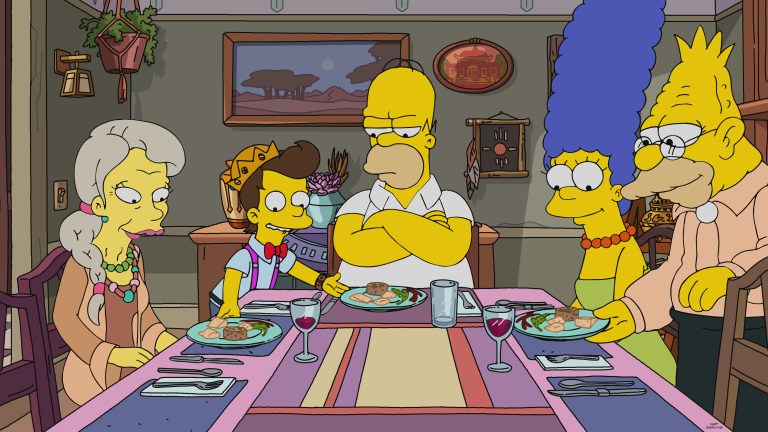The Simpsons Gives Melissa McCarthy Quality Time
Homer fights for Abe’s affection while Lisa and Bart sleep it off in “Step Brother From the Same Planet.”

This The Simpsons review contains spoilers.
The Simpsons Season 34 Episode 8
After 34 seasons, The Simpsons knows the things which truly unite people: childhood trauma and unregulated slumber parties. “Step Brother from the Same Planet” separates these universal rites of passage into two fully satisfying storylines, each of which land with silly subversion, and serious evasion.
The main plot involves Homer’s less-than-delicate relationship with his father. Abe sums up his entire character, up to this point in his timeline, with his opening line. While the rest of the retirement home residents are having their auras cleansed, he moans “I don’t want inner peace.” This is his whole vibe, and when he vibrates past his new soul mate, we know it can’t be contained in a man-bun.
Abe’s new girlfriend Blythe is voiced by Carol Kane, a legend in comedy with access to a million voices. She should have had more scenes because Blythe’s lines offset the sadder undercurrent in parental relations. Melissa McCarthy, who voices her son, Calvin, makes up for it. She brings amazing energy to the part, shading even the shortest dialogue with an evolving personality, and making it whole. Regardless of how Abe and Homer might feel at any given moment, Blythe and Calvin would be welcome recurring characters.
At first, Calvin resembles a budding Martin Prince: nerdy and weird, speaking with big words when small words will do. Who introduces themselves in Shakespearean? It’s brilliant, really, and more so because the character grows defiant, competitive, angry and compassionate. Homer has Calvin pegged as a psycho, until he realizes he is just a “weirdo.” The jealousy is excruciatingly voiced by Dan Castellaneta, who wrings every last drop of pathos from his comic arsenal. Homer and Calvin’s journey kicks into motion with a pillow fight, zipper first, which means war.
The episode opens at a craft fair where “everything is made out of garbage” and “no outside macramé” is allowed. This is a frightful indictment on the art of crafting, and also works as foreshadowing for when the most meaningful communication comes through seashells and roadkill taxidermy. Homer believes dead animals are meant to be poked with a stick, which is also how he best addresses Abe.
“I stuck him in the worst nursing home I could find thinking he would read between the lines,” Homer explains to a wide-eyed Calvin. Abe’s sentencing to the retirement community has been an open joke throughout the run of the series. The vengeful nature of the consignment makes it funnier as well as sadder. The scene where Abe speaks to Calvin, while mistaking him for Homer, is an eye-opener for the character and the audience. A lot of history is played out in the absence of words, and all under a fairly ridiculous covering. It feels like the angry past encroaches on the humor itself.
The episode reverts to form in the subplot, Lisa and Bart work together against the greater good. When they team up, there’s nothing they can’t do. In the past, they’ve saved Krusty the Clown from jail, “Itchy and Scratchy” from censors, and Springwart’s School of Magicry from Lord Montymort. Of course, they can throw the ultimate slumber party. “No rules,” Lisa proclaims. “No limits, and dare I say it: no slumbering.”
Sherri and Terri score a great putdown with the “blanket that tattles and kills all joy” assessment, making their overall arc with Lisa that much more effective, and letting them jump on the bed all they want. The party scenes themselves are fun. Millhouse finds his calling as the tactical diversion at the cellphone switchboard, especially when he refers to himself as a fellow parent. Lisa’s inner neediness comes through hysterically in the lollipop addiction, and her dramatic exit drives the point home with sirens blaring. It is also funny that Bart is the one who first tries to slow the ultimate wakeup call.
The episode showcases “unprocessed trauma,” as Moe says in a toast. Nothing beats it for storylines and character development. This is especially true when the subject is the most reluctant to change. Abe has come a long way, yet barely moved. He grows in increments and small inner gestures, like displaying Homer’s shell craft. In this episode, he comes to a grudging understanding, but he does everything with a grudge. He ultimately embraces his shortcomings, and still feeds the thermostat.
Irony is the secret sauce to The Simpsons, which celebrates the negatives in order to accessorize the positive. “Step Brother from the Same Planet” makes no attempt to redeem Abe, and allows Lisa her rebel yell. There are a lot of individual laugh lines, not so many gags, and the sadness is humorously weaponized even as it still packs enough heartache to register. The mismatched eyes badly glued on the seashell is a very effective emotional visual which exemplifies the art of contradictory storytelling. It looks silly, sloppy, and unfulfilled, but is actually a perfectly poignant payoff that doesn’t lose sight of the joke.
